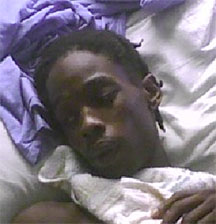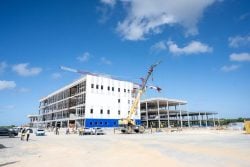Independent medical examinations of Colwyn Harding, a former detainee who has alleged that a policeman raped him with a baton, have found that his rectum was damaged as a result of the insertion of a foreign object, his lawyer said yesterday.
A report from the local doctor has been handed over to the Director of Public Prosecutions (DPP) for her to consider and plans are now in motion to sue the government over the injuries Harding allegedly sustained while in police custody, attorney Nigel Hughes said yesterday.
Police sent a file on their investigation of the alleged baton rape along with the recommendations of the

Office of Professional Responsibility (OPR) and the Police Complaints Authority (PCA) to the DPP late last week. When Stabroek News made checks late yesterday afternoon, the file was still at the chambers of the DPP.
Harding has accused a policeman of using a baton to sexually assault him on November 15 last year before taking him to the Timehri Police Station, where he said he was repeatedly beaten.
Hughes made the disclosure of the results of the medical examinations when members of the Colwyn Harding Support Committee held a press conference at the Red Thread office yesterday.
Based on what reporters were told, the first independent medical examination was done on January 25, at the St Joseph Mercy Hospital. Reading from a prepared statement, a member of the support group, Roxanne Myers, said that during that examination it was found that there was active rectal mucosal bleeding and the rectum was inflamed. She added that the evaluation also concluded that there was multiple trauma, incarcerated right inguinal hernia, intestinal resection and anastomosis and intestinal wound dehiscence and the construction of ostomies.
Myers said that on February 5, eight days after Harding went to Jamaica, he underwent a second medical examination. She said that the findings of that examination were consistent with findings of the local referring surgeon. “Like the local report, the Jamaican surgeons noted that there was inflammation of the rectum. The main finding of the Jamaican report was a narrowed distal sigmoid as the surgeons were unable to go beyond 25cm with the scope, indicative of an injury that is consistent with abuse,” she said.
Myers noted that Harding was discharged from the Georgetown Public Hospital (GPH) on January 20, following a total of 33 days spent there. After his discharge, he was immediately taken to a private doctor to be evaluated and he was readmitted to a private hospital with sepsis, fever and in obvious distress.
The hospital charts retrieved by Hughes on behalf of the family, she said, indicated that Harding had undergone three procedures.
However, she related the Support Committee’s alarm at the number of inconsistencies in the GPH’s records, including incorrect page numbering, missing details and chronological errors. She added that there were differences in terminology to describe the original problem, such as ‘hydrocele’ in one document and ‘incarcerated hernia’ in another document as well as signatures but no names of doctors written on the charts, and different handwriting on several pages of the charts which bear the same name.
“…Both the local and overseas surgeons questioned the validity and reliability of some pages in the patient’s chart,” Myers said, while adding that the Support Committee now questions whether some pages may have been reconstructed.
According to Myers, the Jamaican surgeons recommended further study of Harding’s intestines before he undergoes more medical procedures. “The results of the further study should provide more details about the narrowed distal sigmoid and number of surgeries that may be required to remove stomas. This will be done shortly and we anticipate Colwyn will be ready for surgery within 6 to 8 weeks to have the ostomies reversed (closed),” she said.
Harding, who has returned to Guyana from Jamaica, was reported to be doing much better. He is now able to move around unaided. It is hoped that funds could be raised between now and when he is due for a further procedure. Reporters were later told that US$7,500 is needed for the surgery and it is preferred that it be done in Jamaica.
Meyers also disclosed that a total of $873 316 was raised in cash by the Colwyn Harding Support Group within a three-week period during January. A total of $508 492 of the sum raised was used to finance the Jamaica consultation, including air travel, accommodation, doctors’ consultation and examination, travel expenses, meals and subsistence for Harding and team. Of the remaining $364,824, $354,489 of was spent on a number of things, including colostomy bags and nutritional supplements.
‘Foreign object’
Meanwhile, Hughes dismissed statements that there was no evidence to support the alleged sexual assault using a foreign object. “…Mucosal bleeding was still found in the rectum which confirms that a foreign object has actually caused that injury,” he said.
Asked later how strong a case he has, Hughes told reporters that there is a complaint as well as medical records that confirm that Harding was assaulted. He said that the examination on January 25 showed that he was still bleeding two months after the alleged assault took place. “It does demonstrate the severity of the injury that was caused to him,” he said, while noting that doctors from the Georgetown Hospital press conference confirmed that they did not examine either Harding’s rectum or anus.
Asked whether the independent doctor specifically said that the bleeding was as the result of the insertion of an object, such as a baton, Hughes explained that doctors would not explicitly say that. He said that anyone who conducts an examination gives a report of what they see and normally what happens is that the doctors in an interview would listen to the circumstances that led to the injury. Having listened to those circumstances, he said they record physical findings that are there as well as suggest what it was consistent with or indicate that they are unable to make a judgement. In this case, he said that both doctors – the one here and the one in Jamaica – said, “It was very consistent with. So in other words the active bleeding was not as a result of some pre-existing medical condition, it was as a result of the insertion of a foreign object,” he emphasised.
Hughes also told reporters that two days ago he wrote to the Attorney General and invited him to indicate whether he was prepared to embark on discussions as it relates to the payment of damages. “This again is an attempt to afford the authorities and state a reasonable opportunity to embark on a serious discussion about the question of damages,” he said, while adding that within the next fortnight civil proceedings will be instituted.
According to Hughes, he is very comfortable with the evidence that he has. He said in addition, there are witnesses to the mistreatment meted out to Harding from when he was first taken to the Timehri Police Station.
Asked about a possible cover up, Hughes opted not to comment on this saying that he would rather leave it up to the public to be the judge when the facts are presented. “The facts will speak for [themselves]. If the facts lead you to conclude that some attempt had been made to distort what has happened, it is for you to draw that conclusion. We shared with you the uncontroverted facts that we have. We have the facts from the witness statements and we have the facts of the medical report…,” he noted.
The medical report from the local doctor was not sent to the Chairman of the PCA, Hughes said while explaining that this was not a complaint against the police but rather the allegation of a criminal offence and in the circumstances it was sent to the appropriate authority–the DPP. He stressed that the local report has more weight in the circumstances.
Hughes did not identify the local doctor but said the person is a doctor of long standing and holds positions of significant responsibility in the medical field.





